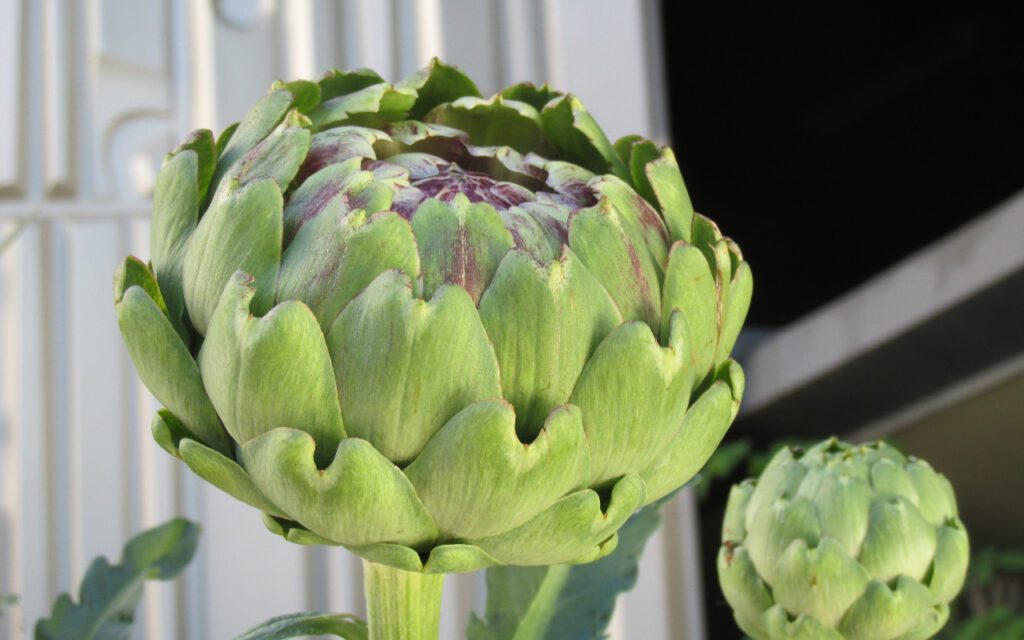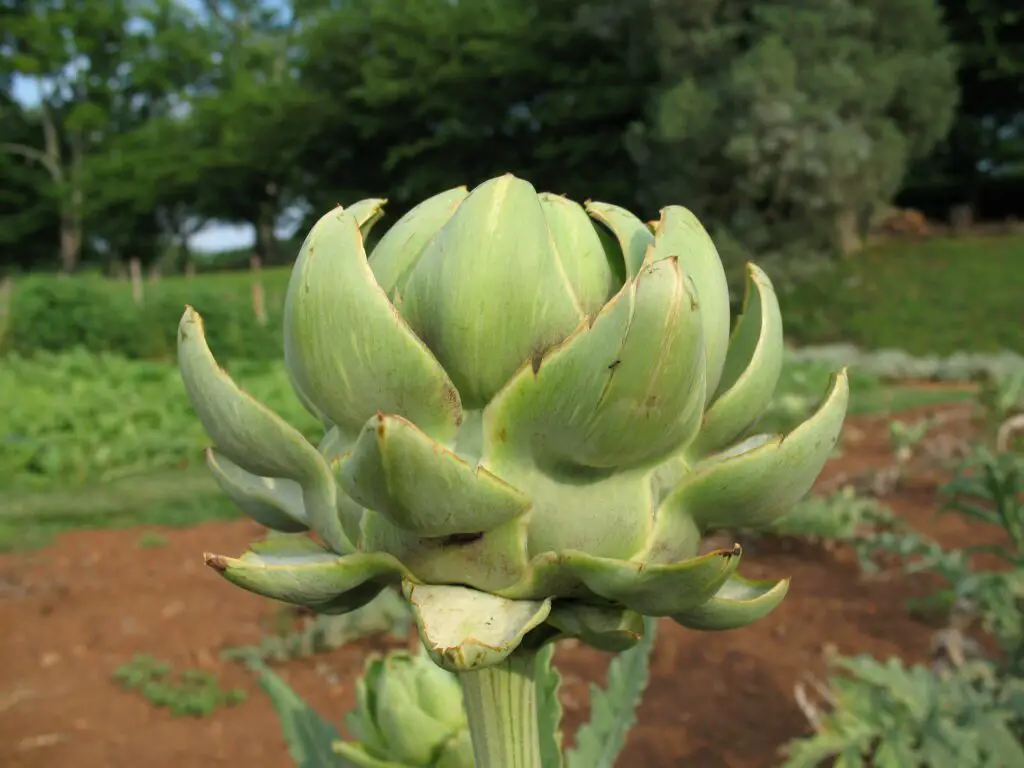As a dog owner, it’s natural to want to share the foods you love with your furry friend. However, it’s important to remember that not all human foods are safe for dogs to eat.
One vegetable that often raises questions is artichokes. While artichokes can be a delicious and healthy addition to our diets, can dogs eat artichokes too?
In this article, we’ll take a closer look at the nutritional benefits and potential risks of feeding artichokes to dogs.
- Can Dogs Eat Artichoke?
- How Many Artichokes Can Dogs Eat?
- How Often Can Dogs Eat Artichoke
- Health Benefits of Artichoke To Dogs
- Potential Risks of Feeding Artichoke To Dogs
- Nutritional Benefits of Artichoke For Dogs
- Are Dogs Sensitive To Artichokes?
- How To Prepare Artichoke For Dogs
- How Fast Will Dogs Digest Artichoke
- FAQs
- In Conclusion
Can Dogs Eat Artichoke?

Yes, dogs can eat cooked artichoke (hearts, stem, and skin) in moderation. In fact, artichokes are a healthy addition to a dog’s diet.
However, before feeding your dog artichokes, you should keep a few things in mind.
Artichokes are not a typical food for dogs, and some dogs may not be able to digest them properly.
Plus, raw artichokes contain a compound called cynarin that can cause gastrointestinal upset in dogs when eaten in excess.
That being said, cooked artichokes can be a great source of vitamins, minerals, and fiber for dogs, provided they are given to dogs in moderation and without any added oils or seasonings.
It’s always best to consult with your veterinarian before making any changes or additions to your dog’s diet.
See also: 47 Safe Vegetables To Feed Your Dog. Puppy Power!
How Many Artichokes Can Dogs Eat?

The amount of artichokes a dog can eat depends on several factors, including the size, age, and overall health of the dog, as well as its individual tolerance to the vegetable.
As a general guideline, it’s best to start with small amounts, such as a few cooked artichoke hearts, and monitor your dog’s reaction.
If your dog tolerates artichokes well, you can gradually increase the amount over time.
However, it’s recommended not to feed your dog too many artichokes, as it can lead to digestive upset, such as vomiting, diarrhea, or gas.
In general, treats should not make up more than 10% of a dog’s daily caloric intake, so it’s best to keep artichoke consumption to an occasional treat rather than a regular part of their diet.
Artichoke Feeding Chart According To Size
| Food | Size | Portion |
|---|---|---|
| Artichoke | Toy dogs | 1 artichoke |
| Artichoke | Small dogs | 1 artichoke |
| Artichoke | Medium dogs | up to 2 artichokes |
| Artichoke | Large Dogs | up to 3 artichokes |
Artichoke Feeding Chart According To Age
| Food | Age | Portion |
|---|---|---|
| Artichoke | 0 – 6 months | Don’t feed |
| Artichoke | 6 – 12 months | 1 artichoke |
| Artichoke | 12 – 24 months | up to 2 artichokes |
| Artichoke | 24+ months | up to 3 artichokes |
How Often Can Dogs Eat Artichoke
Since artichokes are not a typical food for dogs, it’s always best to feed them in moderation and as an occasional treat rather than as a regular part of their diet.
Once you have determined that your dog tolerates artichokes well, you can offer them as a treat every two weeks or once a month.
Additionally, it’s important to consider the serving size: if you choose to give your dog artichokes, it’s recommended to give only small portions, such as a few cooked artichoke hearts, rather than an entire artichoke.
Remember, a balanced and nutritionally complete diet is the key to your dog’s good health, so always consult your veterinarian before making any changes or additions to your dog’s diet.
Health Benefits of Artichoke To Dogs
- Rich Source of Nutrients. Artichokes contain an abundance of essential vitamins and minerals, including vitamin C, vitamin K, potassium, and folate. These nutrients can help promote a healthy immune system, maintain healthy bones, and support overall health in dogs.
- High in Antioxidants. Artichokes are packed with powerful antioxidants that can help protect dogs against cellular damage caused by free radicals. Antioxidants also promote healthy skin, coats, and eyesight.
- Aids in Digestion. Artichokes are an excellent source of fiber, which can help regulate digestion and prevent constipation in dogs. Fiber can also help promote healthy gut bacteria, thus aiding in the overall digestive health of your dog.
- Supports Liver Health. Artichokes contain a compound called cynarin that can help support liver function and promote better digestion. This is especially true for dogs with liver issues or those who have been on medications that can damage their liver.
- Lowers Cholesterol. The cynarin in artichokes is also believed to help lower cholesterol levels in dogs, which can reduce the risk of heart disease and other related health issues.
- Anti-Inflammatory Properties. Artichokes contain anti-inflammatory properties that help improve joint health and reduce the risk of chronic inflammation in dogs.
Potential Risks of Feeding Artichoke To Dogs
- Digestive Upset. Dogs may experience digestive upset, such as vomiting or diarrhea, if they eat too many artichokes or if they are not used to consuming this vegetable. This is especially true if the artichokes are raw, which contains cynarin which can be difficult for some dogs to digest properly.
- Choking Hazard. The tough outer leaves and prickly choke of the artichoke may pose a choking hazard to small dogs or dogs who are not experienced in chewing this vegetable thoroughly.
- Allergic Reactions. Some dogs may be allergic to artichokes or develop an allergy after repeated exposure to the vegetable. Symptoms of an allergic reaction may include itching, hives, and difficulty breathing.
- Too Much Fiber. While fiber is good for dogs, consuming too much of it from artichokes can cause gastrointestinal issues, such as bloating and gas.
- Seasonings. Artichokes are generally safe for dogs to eat, but any seasonings or flavorings added to them can be harmful. For example, garlic, onion, and salt can be toxic to dogs.
Nutritional Benefits of Artichoke For Dogs
| Artichoke Nutrition Facts per 100 grams | % DV * |
|---|---|
| Calories | 47 |
| Total Fat | 0.2 g |
| Cholesterol | 0 mg |
| Sugar | 1 g |
| Glycemic Index | 20 |
| Sodium | 94 mg |
| Carbs | 11 g |
| Protein | 3.3 g |
| Vitamin D | 0% |
| Calcium | 4% |
| Iron | 7% |
| Potassium | 370 mg |
Are Dogs Sensitive To Artichokes?
Dogs can be sensitive to artichokes, and some may have difficulty digesting them properly.
This is because artichokes contain a compound called cynarin, which can cause digestive upset in dogs, especially when consumed in large quantities, or if the artichokes are eaten raw.
Cynarin may be difficult for some dogs to break down, which can lead to diarrhea, vomiting, or gas.
Additionally, some dogs may be allergic to artichokes or experience an allergic reaction after repeated consumption.
Therefore, it’s essential to start by feeding your dog small amounts of cooked artichokes and gradually increase the amount over time while carefully monitoring their reaction.
If you notice any digestive issues or allergic reactions, stop feeding your dog artichokes immediately and consult your veterinarian.
How To Prepare Artichoke For Dogs
Boiled or Steamed
Boiling or steaming artichokes is one of the healthiest ways to prepare them for dogs. First, remove the tough outer leaves and the prickly choke from the center of the artichoke. Then, cut the artichoke into manageable pieces and place them in a pot or steamer basket with enough water to cover them. Boil or steam them for about 30-40 minutes, or until they are tender enough for your dog to eat.
Roasted
Another way to prepare artichokes for dogs is by roasting them. Start by removing the tough outer leaves and the choke. Then, cut the artichoke into manageable-sized pieces and toss them in a bit of olive oil. Roast the artichokes in the oven at 350°F for about 20-30 minutes or until they are tender.
Pureed
If your dog prefers softer textured foods or is having trouble chewing, you can make a puree out of artichokes. First, boil or steam the artichokes until they are soft enough to mash into a puree. Then, place the artichokes into a food processor or blender and puree them until they form a smooth consistency. You can serve the artichoke puree alone or mix it with your dog’s regular food as a flavor enhancer.
How Fast Will Dogs Digest Artichoke
The speed of digestion in dogs can vary depending on several factors, such as age, size, and individual metabolism.
However, in general, it can take anywhere from 2-6 hours for dogs to digest food, including cooked artichokes.
The digestion time is influenced by the amount of food consumed, the dog’s digestive health, and the form of the food it ate. Whole artichokes may take longer to digest compared to smaller pieces or purees.
The digestive process breaks down the artichoke, and the nutrients are absorbed by the dog’s body. Any food that is not digested and absorbed will be excreted as waste.
If you notice that your dog is having trouble digesting artichokes or experiencing any digestive upset, it’s best to reduce or eliminate the number of artichokes in their diet and consult with your veterinarian.
FAQs
Can dogs eat artichoke hearts?
Yes, but it’s not recommended. Artichoke hearts are high in fiber and can cause digestive upset if fed to dogs in large amounts. Additionally, artichoke hearts may contain small traces of toxins that can be dangerous for your pet.
Can dogs eat artichoke leaves?
Yes, dogs can eat artichoke leaves. However, it is important to remember that artichokes contain a compound called cynarin which can be toxic to dogs and cats in large doses.
Can dogs eat artichoke stems?
Yes, dogs can eat artichoke stems. However, it is important that the stem should be cooked properly to avoid any potential choking hazards. Additionally, artichokes contain a compound called cynarin which is toxic for dogs in large amounts.
In Conclusion
In conclusion, artichokes are not toxic or poisonous to dogs, and they can bring several health benefits when consumed in moderation, including fiber, vitamins, minerals, and antioxidants.
However, it’s crucial to remember that artichokes are not a typical food for dogs, and some dogs may have difficulty digesting them or show sensitivity to them, especially if the artichoke is raw or seasoned with harmful ingredients.
Always introduce artichokes to your dog’s diet in small amounts, cooked thoroughly, and without seasonings. As with any new food, closely monitor your dog’s reaction and consult with your veterinarian if you have any concerns.
Feeding your dog a balanced and nutritionally complete diet is key to his or her good health, so always consult with your veterinarian before making any changes or additions to their diet.





Leave a Reply